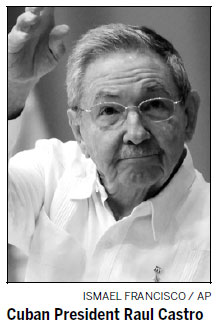Castro: Cuban economic changes must be gradual
Cuban President Raul Castro reiterated on Saturday that Cuba's program of reforms will remain cautious and gradual, despite recent disappointing GDP numbers that show the country's already-struggling economy slowing.
Days after Cuba downgraded its 2014 economic growth forecast by nearly 1 percentage point, Castro told parliament during the first of its twice-annual regular sessions that the reforms "have great complexity but are advancing" at the necessary pace.
"Our growth rate is not something we are pleased with, but it does not discourage us in the least," the 83-year-old president said.
Castro said the pace of reforms would remain deliberate.
"The gradual nature of a series of activities that we are approving is indispensable," Castro told 548 members of the National Assembly at its one-day, semiannual meeting.
"Gradualness is not a whim, much less a desire to delay the changes that we must make," he added. "On the contrary, it is about a need to ensure order and avoid gaps that would lead us directly to mistakes that distort the proposed objectives."
Castro urged Cuban workers to work "hard and optimistically, to turn this around and guarantee growth rates that will make socialist development possible".

"This process, to be successful, must be conducted with the appropriate gradualness and be accompanied by the permanent control of different party and government structures at all levels," Castro said in a 25-minute speech.
Vice-President Marino Murillo said a nascent project to eliminate Cuba's unique dual currency system is continuing and warned islanders that monetary unification itself will not increase their purchasing power.
"For that to happen, we must produce more," Murillo said.
Cuba's economy minister announced at the end of June that officials were lowering their GDP growth expectations to 1.4 percent for the year, down from a previous forecast of 2.2 percent for 2014 and from 2.7 percent growth recorded last year.
Castro and other officials say the reforms are an "update" of Cuba's socialist model to survive in the 21st century global economy.
Cuba has decentralized state-owned enterprises, legalized home and used car sales and let hundreds of thousands of people open or work for small businesses in the private sector.
Parliament also considered a report on Saturday from the comptroller's office on its attempts to root out corruption. No specifics were given on the nightly newscast.
AP - AFP - REUTERS
(China Daily 07/07/2014 page11)














